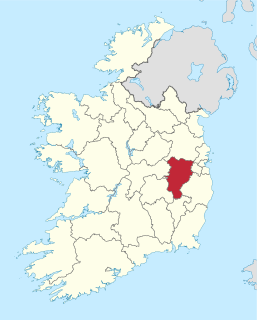
County Kildare is a county in Ireland. It is located in the province of Leinster and is part of the Mid-East Region. It is named after the town of Kildare. Kildare County Council is the local authority for the county which has a population of 222,504.
The Irish presidential election of 1997 was held on 30 October 1997. It was the eleventh presidential election to be held in Ireland, and only the sixth to be contested by more than one candidate. It was held ahead of schedule when incumbent Mary Robinson resigned to assume her new appointment as the United Nations High Commissioner for Human Rights.
Alan James Dukes is a former Irish Fine Gael politician who served as Minister for Transport, Energy and Communication from 1996 to 1997, Leader of the Opposition and Leader of Fine Gael from 1987 to 1990, Minister for Justice from 1986 to 1987, Minister for Finance from 1982 to 1986 and Minister for Agriculture from 1981 to 1982. He served as a Teachta Dála (TD) from 1981 to 2002.
The Irish presidential election determines who serves as the President of Ireland, the head of state of Ireland. The last election took place on 27 October 2018. Where only one candidate is nominated, that candidate is declared elected without a ballot; this has occurred on six occasions.
A county council is the elected administrative body governing an area known as a county. This term has slightly different meanings in different countries.
John Dardis is a former Irish Progressive Democrats politician who server as a senator from 1989 to 2007. He is a retired farmer and former agricultural journalist.
Kate Walsh was an Irish Progressive Democrats politician and community activist from Celbridge, County Kildare. In 2002 she was nominated by the Taoiseach as a member of Seanad Éireann.
J. J. Power is an Irish Green Party politician from Caragh, near Naas in County Kildare. He was educated locally at the Christian Brothers School in Naas and has a degree in Civil engineering from the Institute of Technology, Carlow.

Catherine Murphy is an Irish Social Democrats politician who has been a Teachta Dála (TD) for the Kildare North constituency since the 2011 general election. She is the co-founder and joint-leader of the Social Democrats. She previously served as a Teachta Dála (TD) for the Kildare North constituency from 2005 to 2007.
Joseph Bermingham was an Irish Labour Party politician.
Timothy "Timmy" Conway' is an Irish former politician from Naas in County Kildare. An accountant and long-serving local councillor, he served for six years as a senator in the 1980s and later contested two general elections. In the course of his political career he switched party twice, moving from the Labour Party to the Progressive Democrats and then to Fine Gael.
Matthew Joseph Minch was an Irish nationalist politician from County Kildare who sat in the United Kingdom House of Commons as Member of Parliament (MP) for South Kildare from 1892 to 1903.
Patsy Lawlor was an Irish politician, nurse and businesswoman. She was elected to Seanad Éireann on the Cultural and Educational Panel in 1981 as a Fine Gael member. She lost her seat at the 1983 Seanad election. She was president of the Irish Countrywomen's Association for many years.

Elections were held in January and June 1920 for the various county and district councils of Ireland. The elections were organised by the Dublin Castle administration under the law of the then United Kingdom of Great Britain and Ireland (UK), and held while the Irish War of Independence was pitting UK forces against those of the Irish Republic proclaimed in 1919 by the First Dáil. Elections were held in two stages: borough and urban district councils in January; and county and rural district councils in June. Sinn Féin, which had established the First Dáil, won control of many of the councils, which subsequently broke contact with Dublin Castle's Local Government Board for Ireland and instead recognised the republican Department of Local Government. The election results provide historians with a barometer of public opinion in what would be the last elections held on an all-island basis: the Government of Ireland Act 1920 passed at the end of the year effected the partition of Ireland from 1921. The next local elections were held in 1924 in Northern Ireland and in 1925 in the Irish Free State.

An election to Kildare County Council took place on 23 May 2014 as part of that year's Irish local elections. 40 councillors were elected from five electoral divisions by PR-STV voting for a five-year term of office, an increase in 15 seats compared to 2009. In addition Athy Town Council, Leixlip Town Council, Naas Town Council and Newbridge Town Council were all abolished.

An election to Dublin Corporation took place in March 1899 as part of that year's Irish local elections.
The 1899 Irish local elections were the first local elections following the reorganisation of Irish local government caused by the Local Government (Ireland) Act 1898. The 1898 Act had changed the nature of Irish local governance, replacing the unrepresentative grand jury system, and making local government more democratic and representative. As a result, the 1899 election saw the traditional Unionist Landowning class, which had previously dominated much of Irish local politics, being replaced by a newer nationalist representation. Ulster's local government, however, remained Unionist in political outlook.

The 1924 Northern Irish local elections were held in January & June 1924 for the various county & district councils of Northern Ireland. The election followed changes by the Unionist government, which had redrawn electoral districts, abolished PR for local elections, and implemented a requirement for members of local authorities to take an oath of allegiance.








